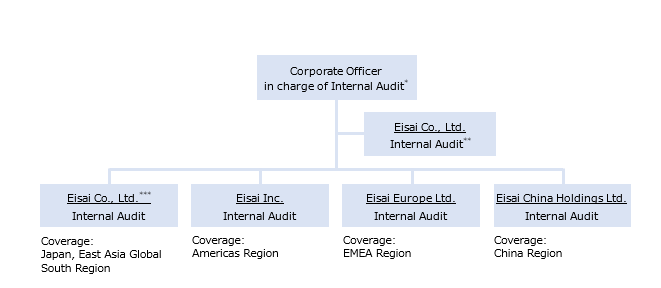Internal Audit Policy
Internal audit is an objective evaluation of a company's key business activities and the provision of necessary advice to help achieve management objectives. As the word "internal" implies, internal audits are performed by people within the company, but the internal audit function is constituted as an organization independent from the business units in order to conduct more objective evaluations.
The Eisai Group's Internal Audit evaluates the business units from the perspective of whether they contribute to increasing the benefits to patients and the people in the daily living domain by developing activities that contribute to sustainable growth and solutions to social issues, while always practicing timely and appropriate judgment and actions based on compliance (adherence to laws, regulations, and ethics).
Internal Audit Mission Statement
In the Eisai Group, the raison d'etre of Internal Audit is to contribute to the realization of the corporate concept through auditing activities. To this end, the Eisai Group's Internal Audit has formulated and published the following mission statement and is constantly evolving our efforts by assessing whether our auditing activities are contributing to the realization of the corporate concept.
Mission
Contribute to the realization of the Eisai Group's corporate concept as a human health care (hhc) company by encouraging continuous improvement of our internal controls.
Vision
Become a trusted advisor providing risk-based, objective assurance and advice with the aim of making a sustainable contribution to patients and the people in the daily living domain based on the corporate concept.
Value
- We work diligently to enhance our individual capabilities as professional internal auditors.
- We respect each and every member of our department to enhance our team strength maximizing our capabilities.
- We conduct audits from an objective and independent standpoint, listening sincerely to the issues faced by the audited organization.
- We conduct risk-based and forward-looking audits to better develop internal controls.
- We conduct audits aimed at providing effective improvement measures.
- We conduct audits that contribute to Eisai group's sustainable growth and enhancement of corporate value.
Internal Audit Characteristics
In 2019, the Eisai Group's Internal Audit system and activities were highly evaluated by The Institute of Internal Auditors - Japan (IIA-Japan) and received its 33rd "Chairman's Award”. 1 The Eisai Group's Internal Audit is characterized by its emphasis on contributing to increase the satisfaction of patients and the people in the daily living domain as a "human health care (hhc) company," and to empower them to realize their fullest life through an hhc ecosystem developed through collaboration with other industries as stated in our corporate concept, while promoting the following initiatives:
- Have a global audit system
- Develop risk-based audit plans
- Conduct audits that contribute to management with a focus on thematic audits
- Have a consulting function in addition to the assurance function
- Support the development of internal controls through audits
- Follow up continuously on the status of remedial actions on issues found during audits
- Have a mechanism to reflect the opinions of all members of the Internal Audit function in order to maintain the audit quality
- Have established the External Assessment Committee and undergo its continuous evaluations to improve our audit quality
- Continue to be active in the professional development of internal auditors
Global Internal Audit System
The Eisai Group conducts internal audits on a global basis under the supervision of the Corporate Officer in charge of Internal Audit, with the cooperation of Internal Audit function in Japan, the United States, Europe, China, and Asia.
In order to maintain and strengthen the global internal audit system, the Eisai Group's Internal Audit holds global meetings on a regular basis to ensure close communication among the function in all regions. In addition, a global team consisting of members of the Internal Audit function from each region is formed each year to conduct global audits. Global audits enable us to centrally understand how critical risks to the realization of the corporate concept are managed across the Eisai Group and where issues exist, to encourage improvements, thereby contributing to increasing the benefits to patients and the people in the daily living domain worldwide.

-
※The Executive Internal Auditor is assigned to assist the Corporate Officer in charge of Internal Audit.
-
※※The Internal Audit at Eisai Co., Ltd. is responsible for coordination among the Internal Audit function in each region as the Group headquarters.
-
※※※For Japan, internal audit activities are shared with the Internal Audit function of EA Pharma Co., Ltd.
Environmental Audits by the Internal Audit function
The Eisai Group's Internal Audit function conducts operational audits to evaluate the status of compliance and risk management throughout the Group, and internal control evaluations related to financial reporting based on the Financial Instruments and Exchange Law. In addition, the function conducts environmental and safety audits to professionally assess the status of compliance and risk management, particularly with respect to the environment and occupational health and safety.
The Eisai Group conducts its corporate activities with an emphasis on protecting the global environment in accordance with the Eisai Group's Environmental Policy. In this context, our Internal Audit function, which is independent of our business divisions, conducts audits of our environmental and safety management endeavoring to contribute to the promotion of corporate activities that emphasize the protection of the global environment from a more objective perspective.
External Assessment of Audit Quality
According to the IIA’s Global Internal Audit Standards, which applies to individual internal auditors and the internal audit activities, the external assessment must be performed at least once every five years.
Against this backdrop, the Eisai Group established the External Assessment Committee in 2013, consisting of independent external experts in accounting, legal, internal control and internal audit, and has since been undergoing an external assessment of our audit quality once every three years and furthermore receiving advice on internal audit activities from the External Assessment Committee every other month in general. Specifically, we have established a system for continuous and autonomous improvement of audit quality through the following initiatives led by the External Assessment Committee, in which we receive objective evaluations based on the Global Internal Audit Standards and advice from the perspective of contributing to increasing benefits for patients and the people in the daily living domain, and improve our audit activities:
- Receive advice from External Assessment Committee on the annual audit plan to improve the focus and approach of individual audits
- Receive advice from External Assessment Committee on individual audit results to improve follow up on findings and the next audit
- Annual self-assessments of audit quality conducted by the Internal Audit function are reviewed annually by the External Assessment Committee to continually improve audit activities for the following year.
1 The "Chairman's Award" was established by the IIA-Japan to commemorate its 30th anniversary (1987) and to contribute to the development of internal audit in Japan. The Chairman's Award is given to a company or management organization that is a member of IIA-Japan and has contributed to the dissemination and development of internal audit by achieving results through continuous and active implementation of internal audit activities over a long period of time with a well-developed internal audit system.

